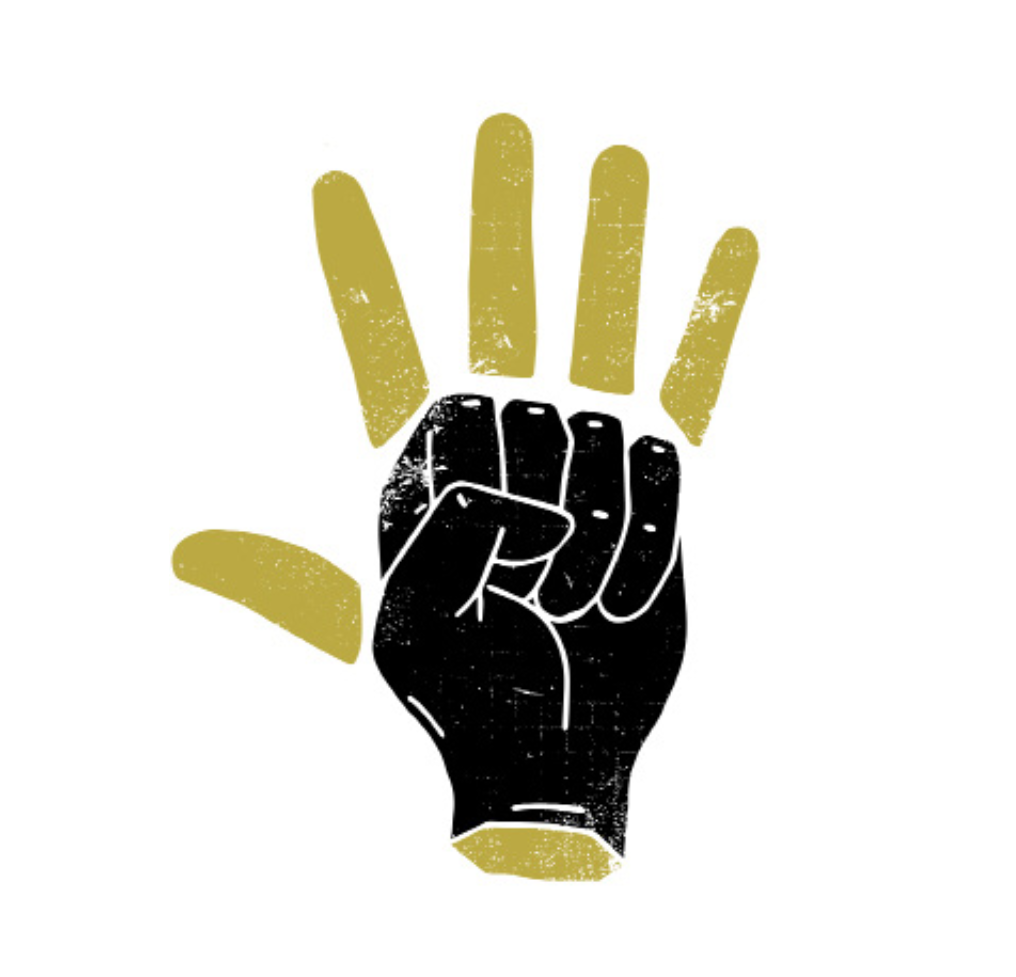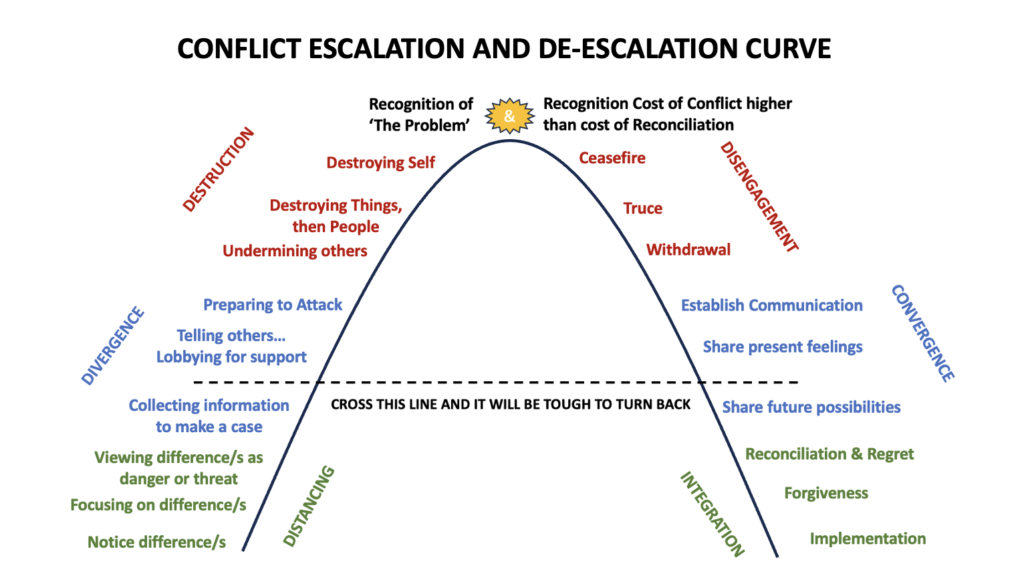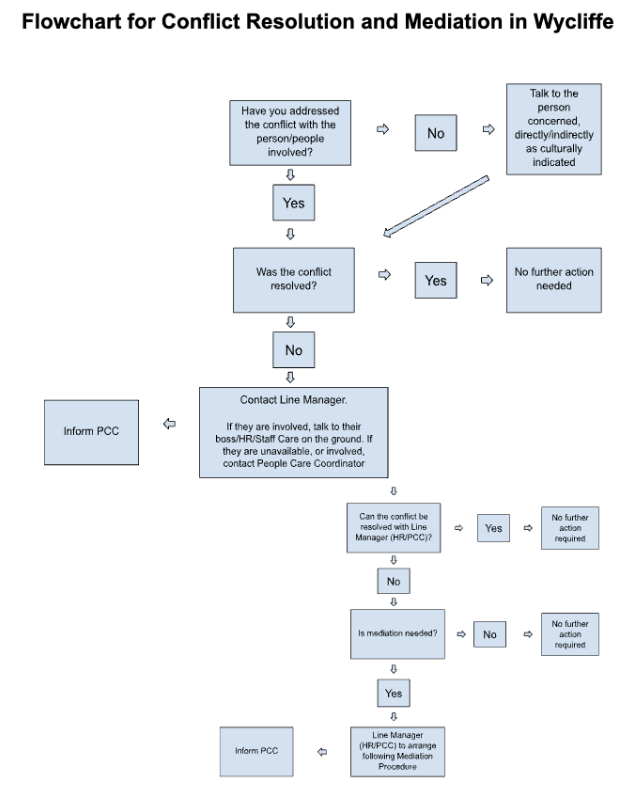Who we are
Flexible co-workers who understand their own strengths and weaknesses and have the resilience to adapt to new roles, challenging situations and changing contexts
Questions to consider
In all of the Wellbeing Guides these same 5 questions are applied to the Characteristic being highlighted. They are an invitation to reflect on the Characteristic and to consider for yourself why it is important.
Why does being a flexible co-worker matter?
What impact do people who are flexible co-workers have?
What does this mean for you in practice?
How you might be able to grow in your ability to be a flexible co-worker?
If you are in leadership, how are you encouraging others to grow as flexible co-workers?
If you would like to be reminded of all the Characteristics in the Wycliffe Profile, go to the following page:
Introducing the Wellbeing Guides
Spiritual Foundations
for Flexible Co-workers
Two are better than one, because they have a good return for their labour: If either of them falls down, one can help the other up. But pity anyone who falls and has no one to help them up. Also, if two lie down together, they will keep warm. But how can one keep warm alone? Though one may be overpowered, two can defend themselves. A cord of three strands is not quickly broken.
Ecc. 4.9-12
This passage from Ecclesiastes can give you real insight into why working together with others really matters. So much more can happen when you work as a team. However, to make this happen well, you need to know yourself well enough to ask for support when you need it, and be flexible enough to step up and help others where you can. Canada geese demonstrate these ideas of interdependence and cooperation really well. They show remarkable resilience and cover vast distances by relying on one another, taking turns and stepping out of the way when rest is needed. The message conveyed is powerful: when you make it your practice to rely on God and know yourself well enough to ask for help from the people he has placed in your life, you will go further and last longer, and quite possibly have a better time of it by staying warm!
In the Wellbeing Guides you will find paragraphs (like the one in the green box below) that express what the particular Characteristic being highlighted might look like using active verbs such as: ‘I am maintaining’, ‘I am seeking to grow…’. These paragraphs try to capture aspects of what each Characteristic is about as holistically as possible.
In terms of spiritual foundations, the same paragraph is used in each Guide, but is applied each time through the lens of the Characteristic in focus. Hence, very different questions arise from exploring the idea of, for example, ‘extending grace to others’ as Adaptable Communicators and as Innovative Investigators.
I am maintaining and deepening my spiritual walk, seeking to grow more like Christ through God’s grace. I am extending that grace to others, whole-heartedly participating in community life and demonstrating the fruit of the spirit. I am seeking to grow in understanding and engagement with the leading of the Holy Spirit, through prayer, study and reflection with others.
As you consider both your current circumstances and any possible changes ahead of you this year, bear in mind the need for flexibility and adaptability. These attributes require the courage to be vulnerable and clear-sighted enough to see yourself as God sees you, with all your strengths and weaknesses. Take some time to ask God to help you see the plentiful resources he has provided, and the people he has put in your life to help you learn and grow. Be prepared to find them in surprising places.
YOU AND GOD’S PEACE AND PROVISION
“Never be afraid to trust an unknown future to a known God.”
Corrie ten Boom
“Do not be anxious about anything, but in every situation, by prayer and petition, with thanksgiving, present your requests to God. And the peace of God, which transcends all understanding, will guard your hearts and your minds in Christ Jesus.”
Phil.4.7
- What words would you use to describe how you experience God’s peace and/or provision?
- As you envision the upcoming year, what thoughts emerge regarding any significant challenges and opportunities that lie ahead?
- To what extent are you receptive to embracing new paths and entrusting them to God?
- How open are you to being shown the areas in your life where God has laid up provision for you, or is asking you to be his provision to others?
- What disciplines and practices help you to be more centred on God and might lead you into experiencing more of his peace in challenging circumstances?
YOU AND BEING VULNERABLE
But he said to me, “My grace is sufficient for you, for my power is made perfect in weakness.”
2 Cor.12.9
“The definition of vulnerability is uncertainty, risk and emotional exposure. But vulnerability is not weakness; it is our most accurate measure of courage.”
Brené Brown
- What messages and expectations about vulnerability were part of your early family experience?
- How has your understanding of vulnerability changed over time?
- What messages and expectations do you give to others about being vulnerable?
- How does the fear of vulnerability impact you as you step out and connect with others?
- In what way does the fact that you are beloved by God make a difference to you?
GOING DEEPER
Here we highlight ideas and resources, which you are of course free to explore or not. We have tried to come up with different ways to engage with the topics, suggesting activities, books, blogs, videos….that may interest you. We also encourage you to browse our Library of Resources and/or talk to others, including your Pastor or Spiritual Director or mentor, if you have one, for some recommendations.
Practicing the Presence of God
- Brother Lawrence, who lived in the 17th century, was a monk who became famous at the time for his wisdom and the sense of peace he experienced in his relationship with God. His teachings, from letters and recorded conversations, were brought together after he died and published in the book Practicing the Presence of God. This article by Dr. Andrew Spencer, Four Lessons about Faith and Work from Brother Lawrence, provides an outline of Brother Lawrence’s approach which I have listed below, along with some ideas to try out and some questions to ponder.
- Our attitude about our daily activities can shape our character
- Take some time to write down your daily activities – be as detailed as you can – and consider what emotions you notice about them – anticipation, excitement, irritation, relief, frustration, boredom…
- If you like drawing, you could literally colour your day with the different emotions, but however you do it, pay attention to the dominant feelings and ask God to help you to grow in the fruit of the spirit as you go through your day.
- Our work should be integral to our spiritual life
- Work is the place we occupy for much of our time. God is there with us – ask God to help you see what he is teaching you through the work you are engaged in every day.
- Our work should be for God’s benefit
- When you find yourself losing focus (or even the will to carry on) take a moment to imagine how differently you might feel about the work you are doing if Jesus was actually there with you, encouraging you to keep going. Ask God to help you see what he thinks of what you are doing with your time.
- Simple, consistent practices can help us integrate our work and our faith
- Prayer – with and for others, and on a regular basis – which can include practices such as fasting and individual guided retreats
- Service – at work and at home, includes offering to do some of the boring jobs that need doing, volunteering at a food bank, praying for/visiting the sick…. the list is endless and connected to your gifts
- Growing in wisdom and knowledge – from engaging with the Bible more deeply, through to reading books and/or listening to podcasts on challenging issues
- Our attitude about our daily activities can shape our character
Understanding vulnerability
- Self awareness is an important pre-requisite to a lot of growth of whatever kind. You need to know where you are weak and where you are strong in order to ask for, and offer, help.
- The Bible is very clear about how God chooses the weak of the world (1 Cor.1.27), and wants us to rely on him in our weakness (Judges 6 – Gideon). Yet when you feel weak, you feel vulnerable, which is uncomfortable and frightening at times. If you want to explore this a bit more try reading any of Brené Brown’s books such as Daring Greatly or listen to her Ted Talk The Power of Vulnerability in which she offers some very helpful insights into this very powerful human experience.
- In mission work, some of the most significant and difficult experiences you can encounter include conflict, criticism, and change. These experiences can thrust you into a vulnerable place. Take a moment as you read this to reflect on how much conflict, criticism, and change are currently present in your life and how they might be impacting your well-being and your ability to love and serve others. Consider using one of the prayers in the box below to help you explore what God might be saying to you about these challenges.
Prayers
The images below are taken from a book by Justin McRoberts and Scott Erickson entitled Prayer. In their introduction they comment: “Prayer is a conversation about everything, Words and images are vital tools that can help us grow in the endless and ongoing conversation, but we must understand that the words and images we use are not the content itself. They are excavation tools that help dig toward and into the real content: the ongoing, ever-present conversation between us and the Divine.”

May I no longer be disappointed that other people are not as I wish they were, since I am not the person I wish I was.

May I have the courage to fail, even at work that matters to me. May I know that mistakes are never the end of my process though they are a key part of it.

May my disappointments open the door to hope and the desire to work for a better future instead of leading me to frustration and detachment.

May I never grow tired of starting over or helping others do the same. My hope is always in renewal and resurrection.
Inside Wycliffe
- Your People Care Co-odinator
- Rebecca Ford – Life Coach (depending on availability)
- Sue Pearson – Counsellor
Outside Wycliffe
- Your Pastor/Vicar or your someone on your pastoral team, an elder or deacon
- Spiritual Director – you can ask your parish priest for the name of a spiritual director, or you can click here and you will be taken to a London based page that lists spiritual directors from around the country
- Your prayer support team – if you don’t have one, chat to your PCC about making this happen
- An independent life coach
Retreats
- Emmaus Retreat All Nations Christian College
- Scargill Movement – A Christian Community in the Yorkshire Dales, offering a wide variety of retreats throughout the year, with discounts available
- Lee Abbey – A Christian Community in Devon, offering a wide variety of retreats throughout the year, with discounts available
- Penhurst Retreat Centre – offering individual & group quiet days and retreats
Flexible Co-workers and…
Resilience
Resilient people are realistic people. They are good at recognising that ‘stuff’ happens in life and so are able to roll with the punches. They can do this in part because they understand and manage their emotions effectively and can perceive where the Holy Spirit is at work. This means that they can use the good that God has put in front of them to build themselves up, without letting the bad knock them down. The following paragraph provides a focus for these ideas and will be used in this Guide to explore what this means for you as you work with others.
I recognise, understand and manage my emotions and behaviour. I recognise and understand other people’s emotions and motives, and interact with their behaviours in a manner that improves relationships.
Resilience plays a role in all parts of life but is particularly important in times of transition, whether into new roles or new contexts. In transition, persevering and remaining composed can be difficult. This is because the mental and social structures and processes you use to interact with the world are disrupted. A resilient person has the flexibility and adaptability to develop new ways of relating to new situations. Having the emotional intelligence to know and understand what might trigger you (and those around you) to feel stressed, frustrated or ready to give up, is likely to make a huge difference in whether you can approach what is ahead of you with optimism and creativity. It will also help you to be assertive and make choices that reflect a grounded and godly approach to dealing with the challenges you face.
YOU AND TRANSITION
“We delight in the beauty of the butterfly, but rarely admit the changes it has gone through to achieve that beauty.”
Maya Angelou
“But they who wait for the Lord shall renew their strength; they shall mount up with wings like eagles; they shall run and not be weary; they shall walk and not faint.”
Is.40.31
- Think of some recent transitions and/or changes you have experienced in your life. How would you characterise your approach to them?
- When you think about transition and change, what emotions come to mind, and how have you managed these in the past? Are there ways you could manage them better in the future?
- In what ways have past transitions opened up new opportunities or brought about personal growth?
- How do you deal with the uncertainty and ambiguity that accompanies periods of change? What, for you, makes the difference between thriving and surviving in times like this?
YOU AND THE LONG HAUL
“It always seems impossible until it is done.”
Nelson Mandela
“He gives strength to the weary and increases the power of the weak.”
Is.40.29
- Can you think of a time when giving up seemed tempting, but you chose to persevere instead? Can you identify what prompted you to make this choice?
- How do you handle criticism or negative feedback without losing your motivation to carry on?
- Can you think of an example of a time when someone else’s perseverance inspired you? How did you, or could you, bring what you learned from them into your own approach to challenges?
- Resilience is as much about how you recharge as how you endure. What are some things that you do, or could be doing, to help you thrive and remain joyful and resilient?
- In what ways do you practice self-care and nurture your well-being to ensure you have the strength to continue moving forward?
GOING DEEPER
Here we highlight ideas and resources, which you are of course free to explore or not. We have tried to come up with different ways to engage with the topics, suggesting activities, books, blogs, videos….that may interest you. We also encourage you to browse our Library of Resources and/or talk to others, including your Pastor or Spiritual Director or mentor, if you have one, for some recommendations.
Building Resilience
- Many equate self-care with self-indulgence, seeing the opposite of self-care as self-sacrifice. In reality the opposite is self-neglect, because sacrifice is an active choice to give something up for the benefit of someone else. Self-neglect however, involves simply not doing what you need to do to thrive.
- Take some time to do, or review, this Wheel of Life worksheet. What do you learn about your approach to self-care, and what area/s God might be asking you to give some more attention.
- The Bible has a lot to say about remembering – the children of Israel were a forgetful lot, and we are not dissimilar today! It emphasises how important it is to remember, for example, God’s faithfulness and what he has done and promises to do in your life. It also emphasises how remembering to engage in activities which build faith really matters. Here are a few ideas that might help with this.
- Invite a few Christian friends who you have known for a long time over to your home and ask them to bring photos of themselves, and you from over the years. Have fun reminiscing – and if it feels appropriate consider chatting together about what you were learning about God at those times in your life.
- If you want to read a bit more about resilience, try this article from the Harvard Business School, Resilience Is About How You Recharge, Not How You Endure or, for a more reflective read, try Tony Horsfall and Debbie Hawker’s book Resilience in Life and Faith: Finding your strength in God. This book encourages you to develop your resilience and to prepare yourself for the challenges that life throws at you in an increasingly difficult world.
- God often had people build concrete reminders of his actions and his faithfulness using stones. Consider how you are experiencing God’s faithfulness to you at this point in time – what might help you remember what he is showing you?
- Make a scrapbook with something like Remember God’s Faithfulness as a title – begin to add things that you have learned about God – include dates and people.
- Turn a photo representing what he is showing you into a screensaver.
- Find a stone and write something on it to remember – as you go through the days/weeks add more stones.
Change and Transition
- Transitions are a huge part of life, especially the life of the cross-cultural worker – changing countries, roles, friendships, colleagues, languages…the list is endless and can be be stimulating, exhausting, and often both. In addition to the ideas offered in the Family section of People of Integrity, here are a couple of other thoughts to consider.
- Set aside some time to reflect on the questions above and think about journalling your responses, and/or chatting to your partner or a friend about how you are dealing with change and transition at the moment. Alternatively try this exercise – the Walk of Change – with a view to identifying some of the things that might be stopping you from making a change where you need to.
- The poem below is not written by a Christian, but it offers an evocative description of how you can find yourself repeating patterns of behaviour that lead to you being in the same place again and again. Everyone has these, the question really is though, is God challenging you to think about a particular behaviour or attitude more intentionally right now? If so print this poem out and write alongside each verse where you have been/are at that point with the issue you are dealing with. When you arrive at the verse where you currently are, and the one you would like to be, ask God to help you see a way forward.
Poem
AUTOBIOGRAPHY IN FIVE CHAPTERS
I
I walk down the street.
There is a deep hole in the sidewalk.
I fall in.
I am lost … I am hopeless.
It isn’t my fault.
It takes forever to find a way out.
II
I walk down the same street.
There is a deep hole in the sidewalk.
I pretend I don’t see it.
I fall in again.
I can’t believe I’m in the same place.
But it isn’t my fault.
It still takes a long time to get out.
III
I walk down the same street.
There is a deep hole in the sidewalk.
I see it is there.
I still fall in … it’s a habit.
My eyes are open.
I know where I am.
It is my fault.
I get out immediately.
IV
I walk down the same street.
There is a deep hole in the sidewalk.
I walk around it.
V
I walk down another street.
Portia Nelson
Inside Wycliffe
- Your People Care Co-odinator
- Rebecca Ford – Life Coach (depending on availability)
- Sue Pearson – Counsellor
Outside Wycliffe
- Your Pastor/Vicar or your someone on your pastoral team, an elder or deacon
- Spiritual Director – you can ask your parish priest for the name of a spiritual director, or you can click here and you will be taken to a London based page that lists spiritual directors from around the country
- Your prayer support team – if you don’t have one, chat to your PCC about making this happen
- An independent life coach
Retreats
- Emmaus Retreat All Nations Christian College
- Scargill Movement – A Christian Community in the Yorkshire Dales, offering a wide variety of retreats throughout the year, with discounts available
- Lee Abbey – A Christian Community in Devon, offering a wide variety of retreats throughout the year, with discounts available
- Penhurst Retreat Centre – offering individual & group quiet days and retreats
Flexible Co-workers and…
Teamwork
In order for teams to be effective, it is important for individual team members to be able to adapt to different contexts and, where necessary, deal with conflict in order to meet team goals. The ability to listen and the ability to maintain an openness to different perspectives are critical skills for Flexible Co-workers. The paragraph below will be used in this Guide to think about these concepts and explore their significance.
I cooperate with others and support collaborative efforts to achieve common goals in a variety of contexts. I communicate well, demonstrating a listening attitude and openness to constructive dialogue. I take responsibility for building resilient relationships within a team, including addressing conflict promptly and appropriately.
Good teams, generally speaking, achieve much more than separate individuals could alone. This is not about numbers, (although that helps), rather it is about synergy and the benefits that comes from getting input from a multiplicity of directions and perspectives. The reflections below are designed to give you space to consider how you are doing in your team/s, how you problem-solve and approach conflict, and how the specific challenges of working in a virtual context might impact you.
YOU AND PARTICIPATING IN TEAMS
“Remember, teamwork begins by building trust. And the only way to do that is to overcome our need for invulnerability.”
Patrick Lencioni
“If the whole body were an eye, where would the sense of hearing be? If the whole body were an ear, where would the sense of smell be? But in fact God has placed the parts in the body, every one of them, just as he wanted them to be. If they were all one part, where would the body be? As it is, there are many parts, but one body.”
1 Cor 12.17-20
- How well are you able to articulate your own strengths and weaknesses as they relate to working in a team? How well do you communicate this to others?
- When working with teams or with colleagues, finding a balance between serving others and stewarding your abilities well can be tricky. Do you usually feel able to work from your strengths or do you feel pressured to plug gaps by taking on roles/tasks that are outside your skillset and natural abilities?
- What are the most challenging aspects of working in a team for you, and how can you address these challenges in the future?
- What steps can you take towards building trust in the team/s you are part of and maximising your effectiveness within them?
- If you lead a team, in what ways do you encourage people to work from their strengths and address their weaknesses?
YOU AND DEALING WITH CONFLICT IN TEAMS
“Christ is the reason many enter the pastorate. Conflict is the reason many leave.”
Alfred Poirier
“Make every effort to keep the unity of the Spirit through the bond of peace.”
Eph 4.3
- How do you react when conflict arises, and are your reactions constructive or detrimental to the team’s goals and/or your colleagues’ wellbeing?
- How well do you actively seek to listen to and understand the perspectives and ideas of your teammates/colleagues?
- For those working cross-culturally, how well do you actively seek to understand the conflict resolution styles of the cultures around you?
- What personal growth or skills development can you pursue to improve your approach to conflict in the future?
- If you lead a team (particularly, but not only), what role could you play to promote a culture of constructive feedback and conflict resolution amongst your team and colleagues?
YOU AND VIRTUAL TEAMS
“Remember to enjoy the freedom of being able to work from anywhere and the flexibility to adapt your work to your life rather than the other way around.“
Alex Muench
“Whatever you do, work at it with all your heart, as working for the Lord…”
Col.3.23a
- How comfortable are you with the technology and virtual tools currently used for communication and collaboration? How might you address any issues?
- Do you actively participate in virtual meetings and discussions, or do you tend to zone out and be more passive? What might help you to remain engaged?
- Are there ways that you could foster a more active personal connection with others in your virtual team and build rapport with them?
- In hybrid contexts, which are increasingly common, where some people are working in the same location and others at a distance, how can you foster inclusion?
- What strategies do you use to maintain focus and motivation, and to set boundaries when working in a virtual environment?
GOING DEEPER
Here we highlight ideas and resources, which you are of course free to explore or not. We have tried to come up with different ways to engage with the topics, suggesting activities, books, blogs, videos….that may interest you. We also encourage you to browse our Library of Resources and/or talk to others, including your Pastor or Spiritual Director or mentor, if you have one, for some recommendations.
Team Dynamics
- As you reflect on your participation in teams, consider the ways in which people assume or avoid responsibility. There is a very good book called The One Minute Manager Meets the Monkey which basically explains why some people in a team seem to take on more than they should. If that is you, or someone you work with, it might be helpful to read the book, or watch this youtube video: Who’s got the monkey: creating ownership on purpose.
- If you are in leadership, it might be worth taking the time to watch this short youtube video on the Drama Triangle, and consider how you might find yourself drawn into playing the hero, villain or victim, and what you can do to move into being more of a coach, challenger or creator.
- In his book The Five Dysfunctions of a Team, Patrick Lencioni identifies the following issues that characterise dysfunctional teams: absence of trust; fear of conflict; lack of commitment; avoidance of accountability; inattention to results. Conversely he would describe a cohesive team as being characterised by their opposites: trust; conflict; commitment; accountability; results. As you reflect on the teams you participate in, consider using some of the ideas below to identify what you can do, as a participant or as a leader, to help the team/s you are in be a place where everyone is effective and thrives.
Building a Cohesive Team
- TRUST: in team contexts, trust is foundational and is built by spending time together and getting to know each other as people.
- Identify one or two people in your team you know the least well and arrange to spend time getting to know them better.
- Invest in team building, especially as the team is set up. This is even more important if you are in a virtual team.
- CONFLICT: in team contexts, conflict is about unity not uniformity and involves the ability to disagree, discuss and come to a consensus for the benefit of the team.
- Ensure there is effective information sharing – use a diversity of ways to share what is happening/help people stay up to date.
- Protect the team from negative behaviour by addressing it as soon as it happens.
- Workplace disagreements over cultural, social and political matters seems to have become more common. This article addresses how to deal with polarising issues in the workplace.
- COMMITMENT: in team contexts, commitment is about where you spend your time and what you prioritise.
- If you haven’t done it already, think about completing this Worksheet on Priorities at Work, or revisit it if you have done it, and reflect on what you might want to change.
- ACCOUNTABILITY: in team contexts, accountability involves tracking, monitoring and evaluating the work you and your team/s are doing, and putting measures in place to mitigate potential issues.
- If you do not have an accountability partner/group, consider setting this up with someone.
- Ensure you are aware of the roles different team members have and offer support to others in the team as appropriate.
- RESULTS: in team contexts, the results and impact of our work can be hard to measure but are not impossible to identify, so do take the time to reflect on whether what you are doing individually/as a team is really making a difference.
- Remember, however, that even Paul wrote“I planted the seed, Apollos watered it, but God has been making it grow…” 1 Cor 3.6 – he did not do everything or always get to see the results.
Conflict in Teams
- As stated in the dropbox above, conflict when defined as disagreement on issues is something that should be expected. As the diagram below shows however, if your relationship with someone starts to focus on differences, this can lead to ‘distancing‘ which, even at a low level, can be very counter-productive in teams.
- Sometimes, all we need to move off the Conflict Curve is a chance to re-focus. If this is true of you, consider:
- Taking a day on retreat.
- Talking to your partner/close friend who can hold you accountable for the attitudes/behaviours you may be displaying which might lead towards distancing from those you disagree with.
- Signing up for the Sharpening Your Interpersonal Skills Workshop which has some very helpful input on managing differences and conflict.
- Looking through the books and articles on conflict in the Library of Resources.
- Doing this study on Growing Together and Living Incarnationally, which includes some reflections on the Conflict Curve above.
- If you are currently dealing with conflict that has gone ‘over the line’ on the Conflict Curve, it is important to actively find ways to bring about some resolution. If this is true of you, consider:
- Talking to your Line Manager/HR Manager or PCC.
- Using the flow chart below to help you identify what your options might be
Virtual Teams
- Virtual teams are extremely common in Wycliffe and our partner organisations. However, experience shows virtual teams deal with more challenges than face-to-face teams. This is because they must rely on electronic communications, often have fewer things in common, and often overlap less in working hours. When thinking about virtual teams, it is important to note that the same factors that contribute to building a cohesive team are also important in this context. The issue you face as part of a virtual team, or as a virtual team leader, is that team-building in a virtual context is simply more challenging. It is, however, very doable. Here are a few ideas to think about:
- Encourage the use of diverse media for communication – google chat, email, google docs, trello, slack…there is a lot out there.
- Offer training/mentoring to anyone new to this setting, and periodically organise a catch-up on agreed email/meeting etiquette.
- If you are with SIL, or have access to their training courses through course-connections, they do have two online courses available: Working on Virtual Teams and Leading Virtual Teams.
- Synchronise work schedules where possible – and where it is not, try and find windows where there is overlap and schedule important meetings in those windows.
- Mitigate the effects of physical distance – make sure you can meet, face-to-face, certainly during set up, and preferably once or twice a year.
- For more ideas and thinking on this read this article from CIPD Developing Effective Virtual Teams
Inside Wycliffe
- Your People Care Co-odinator
- Rebecca Ford – Life Coach (depending on availability)
Outside Wycliffe
- Many of our partner organisations have team building support available at area and global levels. It is worth asking your line manager or HR manager for ideas on who might be able to help you with growing and developing as a team.
- An independent life coach
Courses
- In the UK, ACAS (the Advisory, Conciliation and Arbitration Service) offer various training courses including People Management and Dispute and Conflict Resolution
- For some helpful online courses on understanding your own responses to challenging people, as well as looking at virtual teams, if you have access, take a look at SIL’s training:
- Sharpening Your Interpersonal Skills Workshop – this course covers a wide variety of issues including burnout, conflict and cross-cultural communication. It says about itself: SYIS is designed to provide Christian workers and Christ followers everywhere with the essential biblical knowledge, attitudes and skills for relating well with co-workers, family members, friends and those from other cultures.
Flexible co-workers who understand their own strengths and weaknesses and have the resilience to adapt to new roles, challenging situations and changing contexts
From him the whole body, joined and held together by every supporting ligament, grows and builds itself up in love, as each part does its work.


